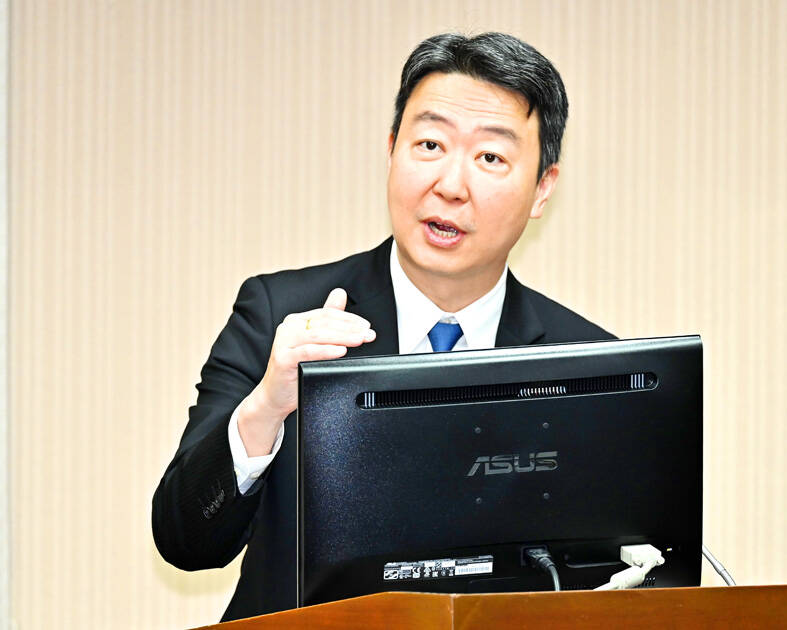Raising the operating speed of the railway service connecting Hualien and Taitung counties to 160kph is unfeasible due to safety issues, Minister of Transportation and Communications Chen Shih-kai (陳世凱) said yesterday.
The ministry in the past advocated using the high-speed rail system as the core of the railway network on the west coast and using an express train system on the east coast.
The policy aimed to limit the operating time in each of the four railway sections to fewer than 90 minutes: Taipei to Kaohsiung’s Zuoying (左營), Zuoying to Taitung, Taitung to Hualien and Hualien to Taipei. That would make it possible to travel around Taiwan proper by railway in six hours.

Photo: Tu Chien-jung, Taipei Times
The Chinese Nationalist Party caucus whip Fu Kun-chi (傅?萁) asked Chen in a meeting of the legislature’s Transportation Committee if the ministry intends to implement the policy, which had been proposed by former transportation ministers and premier.
“It was indeed our policy. However, after a thorough study, we found the policy to be unfeasible. The operating speed cannot be safely raised to 160kph,” Chen said.
The government should fulfill its pledge, Fu said.
The Railway Bureau said that it conducted the feasibility study for the eastern express railway project from September 2020 to May 2023.
“Although the project is technically feasible, after accounting for its overall economic and financial benefits, it turns out to be unfeasible,” the bureau said.
“Enforcing the project would involve upgrading the railway signaling system and eliminating railway crossings by building railway overpasses or initiating grade operation projects. We first need to undertake prudent evaluations,” the bureau said.
It said that it would instead focus on upgrading existing railway lines using heavy rail standards, optimizing the alignment of railway lines, and reinforcing railway bridges, steel railway tracks, power cables and other infrastructure.
Such improvement plans have already been incorporated into projects to electrify the railway line connecting Hualien and Taitung and building dual tracks on the line, the bureau said.
It is also studying the feasibility of realigning and building dual tracks on bottlenecks of the South Link Line (南迴線), it said.
The overall operating speed and passenger service capacity are expected to increase once these projects are completed, the bureau said.

Taiwan is to commence mass production of the Tien Kung (天弓, “Sky Bow”) III, IV and V missiles by the second quarter of this year if the legislature approves the government’s NT$1.25 trillion (US$39.78 billion) special defense budget, an official said yesterday. Commenting on condition of anonymity, a defense official with knowledge of the matter said that the advanced systems are expected to provide crucial capabilities against ballistic and cruise missiles for the proposed “T-Dome,” an advanced, multi-layered air defense network. The Tien Kung III is an air defense missile with a maximum interception altitude of 35km. The Tien Kung IV and V

The disruption of 941 flights in and out of Taiwan due to China’s large-scale military exercises was no accident, but rather the result of a “quasi-blockade” used to simulate creating the air and sea routes needed for an amphibious landing, a military expert said. The disruptions occurred on Tuesday and lasted about 10 hours as China conducted live-fire drills in the Taiwan Strait. The Civil Aviation Administration (CAA) said the exercises affected 857 international flights and 84 domestic flights, affecting more than 100,000 travelers. Su Tzu-yun (蘇紫雲), a research fellow at the government-sponsored Institute for National Defense and Security Research, said the air

A strong continental cold air mass is to bring pollutants to Taiwan from tomorrow, the Ministry of Environment said today, as it issued an “orange” air quality alert for most of the country. All of Taiwan except for Hualien and Taitung counties is to be under an “orange” air quality alert tomorrow, indicating air quality that is unhealthy for sensitive groups. In China, areas from Shandong to Shanghai have been enveloped in haze since Saturday, the ministry said in a news release. Yesterday, hourly concentrations of PM2.5 in these areas ranged from 65 to 160 micrograms per cubic meter (mg/m³), and pollutants were

Taiwan’s armed forces have established response protocols for a wide range of sudden contingencies, including the “Wan Chun Plan” to protect the head of state, the Ministry of Defense (MND) said today. After US President Donald Trump on Saturday launched a series of airstrikes in Venezuela and kidnapped Venezuelan President Nicolas Maduro, concerns have been raised as to whether China would launch a similar “decapitation strike” on Taiwan. The armed forces regularly coordinate with relevant agencies and practice drills to ensure preparedness for a wide range of scenarios, Vice Minister of National Defense Hsu Szu-chien (徐斯儉) told reporters before a